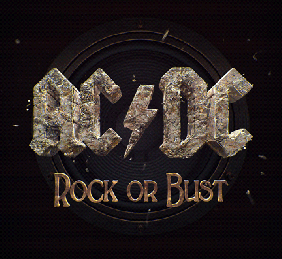
SteveMcCabe.net...
...being the online presence of Steve McCabe himself
On AC/DC, and staying power
December 5th, 2014Rock Or Bust is the fifteenth album from AC/DC; less charitable reviewers have argued that AC/DC have only ever made one album, which they’ve released fifteen times. It’s a good gag, to be sure, but it’s the kind of throwaway comment that would only come from someone who isn’t really paying attention.
And, since it’s very easy, of late, to be distracted, let’s get rid of the distractions before we listen to the music. This is the first album the band have released without input from Malcolm Young. At 61, Malcolm (forgive the first-name familiarity; such are the numbers of Youngs in the band that it simply makes life that bit easier) has retired from music, dementia leaving him unable to play; Stevie Young, the son of the oldest of the Young brothers, Steve, takes his place on the album. (Malcolm gets a writing credit for the songs on Rock Or Bust; in reality, they’re Angus compositions based on fragments the two Young brothers had been working on over the six years since Black Ice.) Phil Rudd, at time of writing embarrassing himself badly and almost daily across the Bay of Plenty, plays drums on Rock Or Bust, but this will likely be his last recording with the band. He was kicked out in 1983, after picking a fight with Malcolm Young, but returned ten years later to replace Chris Slade, a technically excellent drummer who simply didn’t have the swing the rest of the band wanted. But Rudd was an unreliable performer during the Vancouver recording sessions for Rock Or Bust, and wagged the video shoot for Rock Or Bust, the second single from the new album, leaving the band to replace him with Welsh drummer Bob Richardson during filming. Rudd is also noticeably absent from much of the promotional materials for the album, AC/DC clearly looking to put a Tasman Sea-sized distance between themselves and an increasingly toxic and increasingly ex member.
So what’s the album like? Well, to be fair, if you’ve heard recent AC/DC recordings, then you’ll know what to expect. There are only so many ways a classic five-piece guitar-rock band can play the same few chords, and there is, inevitably, a clear lineage from earlier classics to the tracks on Rock Or Bust, but to dismiss the new material as a retread of past glories is to do the band a disservice. The title track is classic AC/DC, a rhythm-guitar workout that, while not actually featuring Malcolm Young, has his fingerprints all over it, Rudd’s steady, unfussy but insistent drumbeat accompanied by the usual unrelenting bass pulse from Cliff Williams. Got Some Rock & Roll Thunder is similarly primitive, even when the verse threatens to descend into the glam rock that singer Brian Johnson clearly hasn’t forgotten from his days with Geordie. The song, like much of the album, has a significantly lighter sound than many of the band’s Johnson-era albums, possibly due to producer Brendan O’Brien, who also produced the band’s last studio album, 2008’s Black Ice. Hard Times, appropriately for its name, has a harder sound, closer to the classic heavy-metal vibe that many fans will be hoping for.
But the album is not, easy joke though it may be, the AC/DC tribute album that some have suggested it is. This is a band who haven’t meaningfully experimented with their music since Crabsody In Blue, on 1977’s Let There Be Rock. But Play Ball, the album’s first single, is a Highway To Hell outtake, to be sure, but there’s some fantastic deep-south noodling in the right speaker. Rock The Blues Away — more a genre declaration than a song title — is the closest AC/DC come to easy listening; you could almost be forgiven for thinking that Angus’ guitar chimes were an electric piano, until the solo kicks in and the unmistakeable scream of his Gibson SG scythes through the mix. The sub-Finbarr Saunders lyrics are back, of course — Emission Control is weak enough a title to be unnecessary, but the song makes a great album closer, a simple, mid-paced riff-rocker that works better than it should.
What makes this album truly remarkable is Rock The House. The best song AC/DC have written since 1981’s For Those About To Rock We Salute You, it owes more than a tip of Johnson’s flat cap to Led Zeppelin’s Whole Lotta Love, but is unequivocally an AC/DC classic. Not far behind is Baptism By Fire, another riff-and-boogie pounding, a song that, again, shows a spark of creativity and imagination that’s been lacking on recent AC/DC releases, but that also knows where the band have come from. Rock The Blues Away, like Got Some Rock & Roll Thunder, has glam-rock roots, and could easily have found a home on Powerage, the band’s sinfully-underated 1978 masterwork; at the same time, I can’t listen to it without thinking of Creedence Clearwater Revival’s Almost Saturday Night. And that’s really not a bad thing.
AC/DC are a vexing band. They are, apparently, an “Australian band,” but the only native Aussie in the band, Phil Rudd, is likely soon to be the last native Aussie to leave the band. With Malcolm Young’s departure, Angus is the only member of the band left who was there when their very first album, High Voltage, was recorded in 1975. Angus’ famous schoolboy outfit has become a caricature of itself. Their music cleaves closely to the simplest of formulae, and yet manages to find, even thirty-nine years after their first release, something — not always very much, but something — new. How much longer they have left in them is another question entirely, but for now, they’re still current.

Leave a Reply